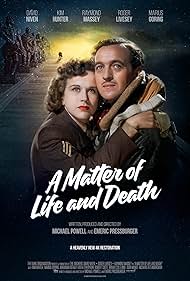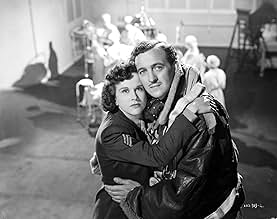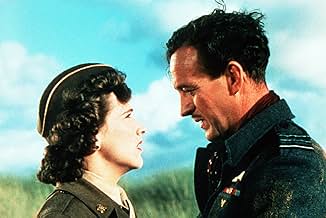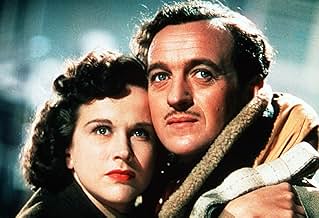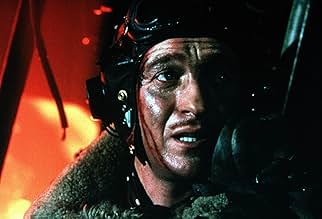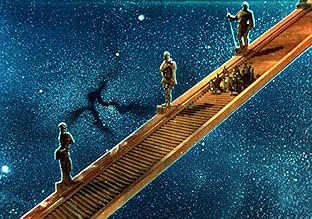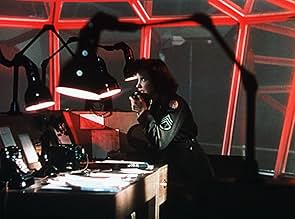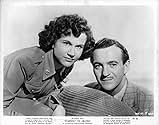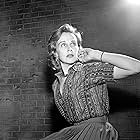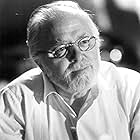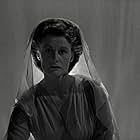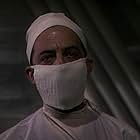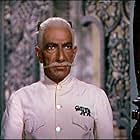A British wartime aviator who cheats death must argue for his life before a celestial court, hoping to prolong his fledgling romance with an American girl.A British wartime aviator who cheats death must argue for his life before a celestial court, hoping to prolong his fledgling romance with an American girl.A British wartime aviator who cheats death must argue for his life before a celestial court, hoping to prolong his fledgling romance with an American girl.
- Awards
- 1 win & 2 nominations
Bonar Colleano
- An American Pilot
- (as Bonor Colleano)
Robert Arden
- GI Playing Snout
- (uncredited)
Robert Beatty
- US Crewman
- (uncredited)
Eric Cawthorne
- Goatherd
- (uncredited)
- Directors
- Writers
- All cast & crew
- Production, box office & more at IMDbPro
Storyline
Did you know
- TriviaThe huge escalator linking this World with the Other, called "Operation Ethel" by the firm of engineers who constructed her under the aegis of the London Passenger Transport Board, took three months to make, and cost three thousand pounds sterling (in 1946). "Ethel" had one hundred six steps, each twenty feet wide, and was driven by a twelve horsepower engine. The full shot was completed by hanging miniatures.
- GoofsAfter Peter's second encounter with the Heavenly Messenger, this time in Frank's library, the doctor and June desperately attend to Peter's condition. June kneels in front of Peter and begins to giggle uncontrollably, then expertly hides herself behind Frank to avoid the camera.
- Quotes
Doctor Frank Reeves: A weak mind isn't strong enough to hurt itself. Stupidity has saved many a man from going mad.
- Crazy creditsForeword (Scrolled up the screen at the start of the film): This is a story of two Worlds the one we know and another which exists only in the mind of a young airman whose life & imagination have been violently shaped by war [Pauses, then scrolls up to reveal] Any resemblance to any other world known or unknown is purely coincidental.
- Alternate versionsThe US release was cut to avoid showing the naked shepherd boy in the sand dunes.
- ConnectionsFeatured in The Story of Making the Film They're a Weird Mob (1966)
- SoundtracksScherzo
(1842) (uncredited)
from "A Midsummer Night's Dream, Op.61"
Written by Felix Mendelssohn
Played on a record at the Shakespeare rehearsal
Featured review
I LOVE this movie. Director Michael Powell once stated that this was his favorite movie, and it is mine as well. Powell and Pressburger created a seemingly simple, superbly crafted story - the power of love against "the powers that be". However, its deception lies in the complexity of its "is it real or is it imaginary" premise. Basically, one could argue that it is simply a depiction of the effects of war on a young, poetically inclined airman during WWII. Or is it? The question is never answered one way or the other. Actually, it is never even asked. This continuous understatement is part of the film's appeal.
The innovative photography and cinematography even includes some nice touches portraying the interests of the filmmakers. For instance, Pressburger always wanted to do a cinematic version of Richard Strauss' opera, Der Rosenkavalier, about a young 18th century Viennese aristocrat. This is evident in the brief interlude in which Conductor 71, dressed in all his finery, holds the rose (which appears silver in heaven). The music even has a dreamy quality.
All of the acting is first rate - David Niven is at his most charming, and he has excellent support from veteran Roger Livesey and relative newcomer Kim Hunter. But, in my opinion, the film's charm comes from Marius Goring as Conductor 71. He by far has the most interesting role, filling each of his scenes with his innocent lightheartedness, brightening the film. It's a pity that some of Conductor 71's scenes were left on the cutting room floor. It is also a pity that Goring's comedic talents are rarely seen again on film, except in the wonderful videos of The Scarlet Pimpernel television series from the 1950s. This is by far and away the most memorable role of his film career. He is a perfect foil for relaxed style of Niven, and his virtual overstatement contrasts so nicely with the seriousness of the rest of the characters. Ironically, also in the mid -1940s, Niven also starred against another heavenly "messenger", played by Cary Grant, in The Bishop's Wife. Their acting styles were so similar that I found the result boring, unenergetic, and disappointing. As a note, according to Powell, Goring desperately wanted the role of Peter Carter, initially refusing Conductor 71. It's a good thing he gave in and gave us such a delightful portrayal.
The movie, "commissioned" to smooth over the strained relations between Britain and the U.S., overdrives its point towards the end. But it is disarming in its gentle reminders of the horrors of war - the numerous casualties, both military and civilian, the need to "go on" when faced with death. There is a conspicuous lack of WWII "enemies" in heaven, but the civilians shown are of indeterminate origin. Powell and Pressburger could have been more explicit in their depiction but it wasn't necessary. The movie may not have served its diplomatic purpose as was hoped for, but its originality continues to inspire moviemakers and viewers alike on both sides of the Atlantic.
The innovative photography and cinematography even includes some nice touches portraying the interests of the filmmakers. For instance, Pressburger always wanted to do a cinematic version of Richard Strauss' opera, Der Rosenkavalier, about a young 18th century Viennese aristocrat. This is evident in the brief interlude in which Conductor 71, dressed in all his finery, holds the rose (which appears silver in heaven). The music even has a dreamy quality.
All of the acting is first rate - David Niven is at his most charming, and he has excellent support from veteran Roger Livesey and relative newcomer Kim Hunter. But, in my opinion, the film's charm comes from Marius Goring as Conductor 71. He by far has the most interesting role, filling each of his scenes with his innocent lightheartedness, brightening the film. It's a pity that some of Conductor 71's scenes were left on the cutting room floor. It is also a pity that Goring's comedic talents are rarely seen again on film, except in the wonderful videos of The Scarlet Pimpernel television series from the 1950s. This is by far and away the most memorable role of his film career. He is a perfect foil for relaxed style of Niven, and his virtual overstatement contrasts so nicely with the seriousness of the rest of the characters. Ironically, also in the mid -1940s, Niven also starred against another heavenly "messenger", played by Cary Grant, in The Bishop's Wife. Their acting styles were so similar that I found the result boring, unenergetic, and disappointing. As a note, according to Powell, Goring desperately wanted the role of Peter Carter, initially refusing Conductor 71. It's a good thing he gave in and gave us such a delightful portrayal.
The movie, "commissioned" to smooth over the strained relations between Britain and the U.S., overdrives its point towards the end. But it is disarming in its gentle reminders of the horrors of war - the numerous casualties, both military and civilian, the need to "go on" when faced with death. There is a conspicuous lack of WWII "enemies" in heaven, but the civilians shown are of indeterminate origin. Powell and Pressburger could have been more explicit in their depiction but it wasn't necessary. The movie may not have served its diplomatic purpose as was hoped for, but its originality continues to inspire moviemakers and viewers alike on both sides of the Atlantic.
Details
- Release date
- Country of origin
- Languages
- Also known as
- Escalera al cielo
- Filming locations
- Saunton Sands, Devon, England, UK(beach: The Burrows)
- Production company
- See more company credits at IMDbPro
Box office
- Budget
- £320,000 (estimated)
- Gross worldwide
- $179,059
- Runtime1 hour 44 minutes
- Aspect ratio
- 1.37 : 1
Contribute to this page
Suggest an edit or add missing content

